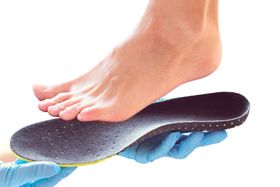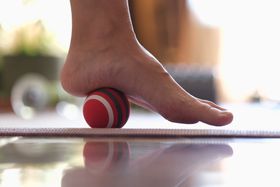How Can Burning Feet Feel Cold at the Same Time?
Learn more about burning feet syndrome, some of its causes, and when to seek medical advice.
Updated March 14, 2023.
Burning feet syndrome, otherwise known as Grierson-Gopalan syndrome, is a medical condition characterized by a burning sensation, aching pain, increased sensitivity, and excessive sweating in the soles of the feet. In severe cases, symptoms are reported throughout the feet, progressing upwards to the ankles and lower legs. The symptoms of pain are usually worse at night and commonly lead to a restless night's sleep.
Burning feet syndrome is often caused by damage to the nerves in the feet and lower legs due to various conditions such as diabetes, excessive alcohol use, vitamin deficiencies, and exposure to certain toxins. Managing the primary cause of the nerve pain is essential in limiting complications that could arise from the condition progressing with time. Orthotics are often seen as a convenient and effective solution to manage the condition.
Causes of Cold Burning Feet
You might have ice cold feet despite the burning sensation, often at night before going to bed. This is because the nerve damage impairs the body's ability to detect temperature changes in the feet. In this case, the nervous system is sending messages to the brain alerting it to burning feet, but when the feet are touched they are cold.
Be mindful of the reduced feedback from the nerves in the feet when using home remedies for treating pain associated with this condition. The skin on the feet may burn if placed in hot water for foot soaking or close to a heat source. You may not feel any damage as it's happening. Wound healing is impaired in people with neuropathy in the feet, therefore good shoes and regular self checks is helpful.
Should You See a Doctor for Cold Burning Feet?
If the sensation of cold feet arises and the feet are cold to touch, this may indicate an issue with the blood supply to the feet. The feet may not be getting enough blood or there could be a clot limiting blood flow to the feet.
Consult with a medical professional should you not be able to warm your feet up, if you feel pain in the back of the calf muscle, or if the skin turns blue. Also, be sure to contact a medical professional if open wounds develop as healing may be delayed due to nerve damage.
Related Articles

How Do Custom and Pre-Made Foot Orthotic Insoles Differ?
Joel Taylor
July 31, 2021

Benefits of Wearing Arch Supports for Your Feet and Ankles
Babafemi Adebajo
December 18, 2024

Why Different Athletes Experience Different Benefits From Orthotics
Upstep Staff
September 18, 2024

Can Flat Feet Cause Back Pain?
Janik Sundstrom
December 9, 2024

How to Rebuild Arches in Flat Feet
Janik Sundstrom
January 7, 2025
Related Posts
Babafemi Adebajo
How to Stop Your Feet From Burning at Night
Babafemi Adebajo
Common Causes of Burning Heels
Babafemi Adebajo
Can Diabetes Cause Your Feet to Burn?
Janik Sundstrom
Can Dry Skin Cause Burning Feet?
Janik Sundstrom



